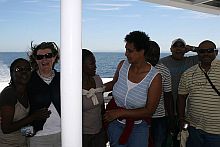Oceanic robots and climate change - elevating schools science?
|
Oceanic robots form part of a wide variety of scientific tools used to observe changes in the world’s oceans. Sea temperature, salinity (salt content) and pressure are but some of the data collected.
The SAEON Egagasini Node joined the African Argo Programme in December by purchasing two Argo floats. These instruments will contribute to the collection of ocean data in a global effort to arrive at a better understanding of climate change in the southern ocean.
South African oceanic data have always been made available by ship-bound scientific tools, so it is a feather in SAEON’s cap that it has become the first South African organisation to invest in robotic floats.
It has always been a challenge to integrate ocean sciences into schools sciences to encourage science-related skills. The Argo programme provides us with an opportunity to support school sciences. On December 4 last year, a group of dedicated educators convened on South Africa’s historic Robben Island to investigate ways to elevate school sciences. We were making history as the Robben Island Educator Workshop was the first of its kind in South Africa.
A forever willing Dr Isabelle Ansorge supported the workshop with content. An expert on the Southern Ocean and physical oceanographer from the University of Cape Town, she spent the night with the educators providing insight on floats, climate change and the role of oceans.
After the content had been presented (which included what Argo floats are, how they work and their importance in ocean sciences), educators discussed how the data could be used at schools. In almost all learning areas and subjects, Argo data activities would encourage outcomes as skills needed by the end users - the learners.
Boosting science skills
Educators and learners would be able to download data and monitor ocean behaviour from their schoolyard. For example, in maths data handling there is an assessment standard that is enforced on most of the grade levels. Working with graphs that determine temperature against depth and salinity, interpreting the data and drawing conclusions from data sets would boost a number of science skills. And what makes it even more interesting, is that all of this works in real time.
During the lively discussions that followed the workshop, educator Naomi Julies from Hout Bay commented: "Getting learners to access data would not only deal with the fact that some learners are still intimidated by computers, but it will also leave them with a skill."
Nompucuko Poswa, a life science educator from Usasazo Secondary School said: "Working with different ecosystems as a requirement in grade 10 life sciences would come in handy now that the difficulty of working with ocean ecosystems would be addressed by the Argo programme."
Related content: Fantastic first for African science - South African Argo programme



